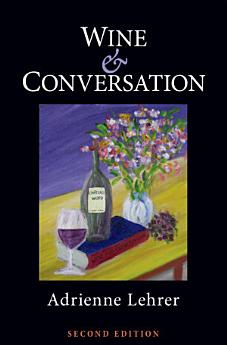Wine and Conversation: Edition 2
اپریل 2009 · Oxford University Press
ای بک
336
صفحات
family_home
اہل ہے
info
reportدرجہ بندیوں اور جائزوں کی تصدیق نہیں کی جاتی ہے مزید جانیں
اس ای بک کے بارے میں
The vocabulary of wine is large and exceptionally vibrant -- from straight-forward descriptive words like "sweet" and "fragrant", colorful metaphors like "ostentatious" and "brash", to the more technical lexicon of biochemistry. The world of wine vocabulary is growing alongside the current popularity of wine itself, particularly as new words are employed by professional wine writers, who not only want to write interesting prose, but avoid repetition and cliché. The question is, what do these words mean? Can they actually reflect the objective characteristics of wine, and can two drinkers really use and understand these words in the same way? In this second edition of Wine and Conversation, linguist Adrienne Lehrer explores whether or not wine drinkers (both novices and experts) can in fact understand wine words in the same way. Her conclusion, based on experimental results, is no. Even though experts do somewhat better than novices in some experiments, they tend to do well only on wines on which they are carefully trained and/or with which they are very familiar. Does this mean that the elaborate language we use to describe wine is essentially a charade? Lehrer shows that although scientific wine writing requires a precise and shared use of language, drinking wine and talking about it in casual, informal setting with friends is different, and the conversational goals include social bonding as well as communicating information about the wine. Lehrer also shows how language innovation and language play, clearly seen in the names of new wines and wineries, as well as wine descriptors, is yet another influence on the burgeoning and sometimes whimsical world of wine vocabulary.
مصنف کے بارے میں
Adrienne Lehrer is Professor of Linguistics (Emerita), University of Arizona. Lehrer has written on many aspects of lexical semantics: the structures of vocabularies and how words in a language are semantically related to one another. She has used wine descriptors and cooking words to test semantic theories. Recent woek has focused on creative neologisms, especially blends and the meaning of affixes.
اس ای بک کی درجہ بندی کریں
ہمیں اپنی رائے سے نوازیں۔
پڑھنے کی معلومات
اسمارٹ فونز اور ٹیب لیٹس
Android اور iPad/iPhone.کیلئے Google Play کتابیں ایپ انسٹال کریں۔ یہ خودکار طور پر آپ کے اکاؤنٹ سے سینک ہو جاتی ہے اور آپ جہاں کہیں بھی ہوں آپ کو آن لائن یا آف لائن پڑھنے دیتی ہے۔
لیپ ٹاپس اور کمپیوٹرز
آپ اپنے کمپیوٹر کے ویب براؤزر کا استعمال کر کے Google Play پر خریدی گئی آڈیو بکس سن سکتے ہیں۔
ای ریڈرز اور دیگر آلات
Kobo ای ریڈرز جیسے ای-انک آلات پر پڑھنے کے لیے، آپ کو ایک فائل ڈاؤن لوڈ کرنے اور اسے اپنے آلے پر منتقل کرنے کی ضرورت ہوگی۔ فائلز تعاون یافتہ ای ریڈرز کو منتقل کرنے کے لیے تفصیلی ہیلپ سینٹر کی ہدایات کی پیروی کریں۔





